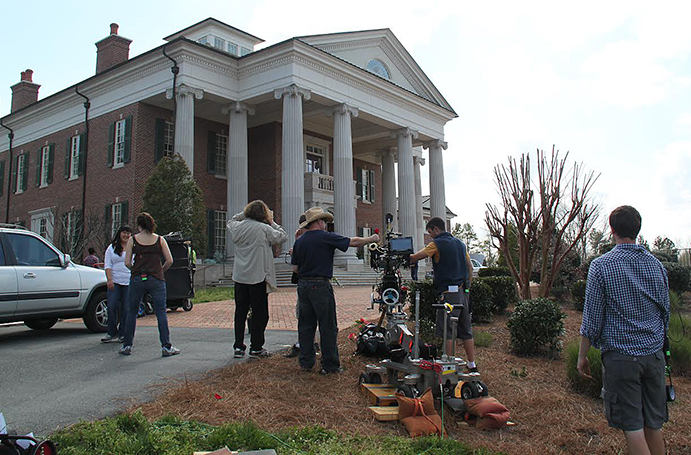Welcome!

Actress Kate Beckinsale receives instructions from Director J.D. Caruso during the shooting of 'The Disappointments Room' in Ramseur.
Where are the lights? Action? Cameras?
ASHEBORO — The Piedmont Triad and other regions in North Carolina should be getting a bigger piece of the film-making pie. That was the message to the Randolph County Tourism Development Authority Board of Directors by Rebecca Clark, executive director of the Piedmont Triad Film Commission.
Clark spoke by Zoom to the TDA board on Nov. 20, relating how reductions in incentives to the film industry by the NC Legislature in 2015 has limited filming to the Charlotte and Wilmington areas, the only two union-designated production centers in the state. Bigger economic impact productions utilize union crew, so when they’re looking at places to bring their business, their first choice is these production centers where they can hire local union crew members.
To film anywhere else, including the Piedmont Triad, productions incur the added expense of having to travel in crew from out of town or out of state, house them, and pay per diem.
The Piedmont Triad Film Commission, Clark said, recruits businesses looking for locations to make films, TV movies, commercials, music videos and more. She promotes the region’s diverse locations, crew technicians and businesses that support the industry.
“It creates economic development,” she said. “Film and TV productions spend a load of money in every location where they shoot. Besides the money spent hiring crew, it’s also spent on renting locations, food, gas, accommodations, rental cars, dry cleaners, building supply stores, props, furniture and a variety of other support services.”
Clark noted that one feature production purchased $60,000 worth of flowers from an Asheboro florist and how impactful one project can be on a local business.
Prior to 2015, before state incentives were limited, some of the productions Clark recruited to Randolph County included:
— The Hallmark channel’s “The Confession” directed by Michael Landon Jr. and filmed at the at Linbrook Estate in Trinity.
— “The Disappointments Room” with Kate Beckinsale which was shot in Ramseur.
— "Red Dirt Rising,” based on the true story of stock car racing legend Jimmie Lewallen, which filmed in Archdale.
Now, Clark said, filming in the Triad is limited to commercials and independent filmmakers.
“Bigger economic impact films have not been shot in the Piedmont Triad region since the state changed the film incentive to the film grant in 2015,” she said. “Major productions attracted by the current film grant are mostly filming in the WIlmington and Charlotte regions. Occasionally Asheville also benefits, simply due to its dramatic mountainscapes and/or the Biltmore House.”

‘The Confession’.
Clark provided figures showing the decline in the film industry in North Carolina after 2015.
Previously there was a 25 percent incentive based on a minimum in-state spending of $250,000. There was a per-project cap of $20 million with no statewide cap per year. All regions of the state benefitted, Clark said.
Since 2015, she said, the state provides a 25 percent incentive, or rebate, with screenplay approval, based on minimum spending of $250,000 for commercials, $1 million for TV movies, $1.5 million for feature films and $1 million per TV episode. The caps are limited to $250,000 for commercials, $7 million for TV movies and features, and $12 million for TV series. There is also a statewide annual cap of $31 million.
That compares to Georgia which has a minimum spending for all projects of $500,000, a 30 percent transferable tax credit, no cap per project, no annual cap and no sunset date.
In 2020, Georgia film production generated $2.2 billion while North Carolina film production generated just $80 million.
“My concern is that our legislators, and many others across the state, do not realize that the current film grant is basically only benefitting two regions of North Carolina, so they also don’t know why that is the case,” Clark said. “The rest of our state is being overlooked, because we currently lack a union crew. Therefore we are losing major economic opportunities, the ability to retain film school graduates — potential taxpayers — that we’re training in the area, and losing other types of businesses that serve the film and TV industry. We’re working hard to turn the situation around.”
Clark said she’s planning to talk to “as many legislators as possible” to change the current incentive package for the film industry. “There’s a dire need to amend the state film program.
“Unlike traditional economic development, when you attract a film, they shoot in four or five Tier 1 and Tier 2 counties that truly benefit from that influx of money it provides,” Clark said. “Also, local people get jobs behind the camera as production assistants, electricians, carpenters and even extras.
“The added bonus is that it provides the community with positive national publicity. And again, it's very financially impactful. It’s a clean, green industry that utilizes locations we have in place without the need to build new roads or structures. To see that go away was devastating.”
Clark said she worked last year with several legislators to create a bill that she’d like to see considered as an amendment to the current film bill. It would just allow productions that film over 75 percent of their productions, house their crew and production offices in Tier 1 and Tier 2 counties to get a 30 percent film grant. This 5 percent increase would offset the cost productions incur traveling in crew, paying for their accommodations and paying per diem.
Clark said, “This small amendment wouldn’t cost the state any additional money, it would simply provide the rest of North Carolina, outside of the two union production centers, the much-needed opportunity to recruit this lucrative business all across our beautiful state of North Carolina."
•••
Note: The North Carolina Department of Commerce annually ranks the state’s 100 counties based on economic well-being and assigns each a Tier designation. This Tier system is incorporated into various state programs to encourage economic activity in the less prosperous areas of the state.
The 40 most distressed counties are designated as Tier 1, the next 40 as Tier 2 and the 20 least distressed as Tier 3.
Most of the 12 counties in the Piedmont Triad Film Commission region are designated Tier 2 with a couple in Tier 1. Randolph County falls into Tier 2.
